Books
Books

Wittig
Figure majeure du féminisme des années 1970, icône de l'écriture et de la pensée lesbiennes, Monique Wittig reste une énigme. Tenant à la fois de l'enquête, du récit et de l'étude, ce « brouillon pour une biographie » cherche à percer son mystère et à écrire sa « vie éternelle » – sa vie vécue et celle qu'elle continue d'avoir après sa mort. Nous n'en avons pas fini avec Wittig, cela ne fait que (re)commencer.
Émilie Notéris est une travailleuse du texte. Elle a préfacé les anarchistes Voltairine de Cleyre et Emma Goldman (Femmes et anarchistes, 2014) et traduit des écoféministes (Reclaim!, 2016 ; Manifeste xénoféministe), ainsi que les militantes féministes Sarah Schulman (La gentrification des esprits, 2018) et Shulamith Firestone (Zones mortes, 2020). Elle a publié en 2020 Macronique. Les choses qui n'existent pas existent quand même (Cambourakis, coll. « Sorcières »), texte de réaction écrit entre octobre 2019 et mars 2020 qui établit un relevé des violences policières, et Alma Matériau (Paraguay), une histoire féministe de l'art.
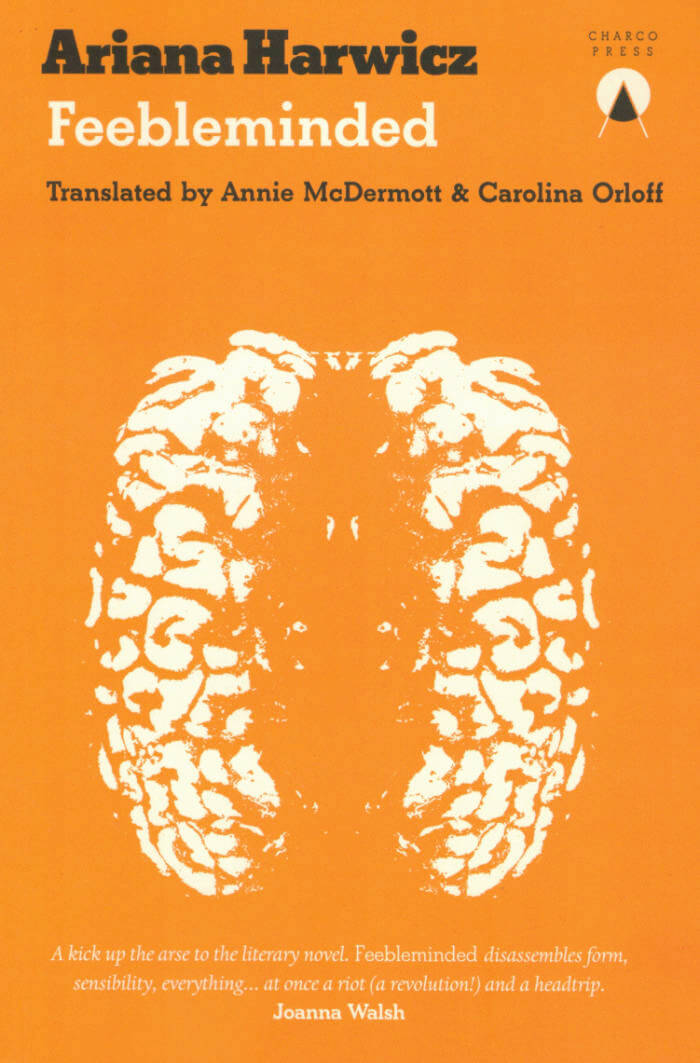
Feebleminded
The unraveling of a mother/daughter relationship that is at once chaotic, loving, and mercilessly destructive.
Following the international success of Die, My Love (longlisted for the Man Booker International Prize 2018), Ariana Harwicz again takes us into the darkest recesses of the imagination with this delirious, furious account of a mother and daughter bound by chaos as much as love. Driven to the edge by the men in their lives, they oscillate between erratic bursts of housework, lazing in the garden, and drunken escapades. But is the constant undercurrent of violence all in the daughter's mind or will they actually go through with their plan for revenge? With a shocking, edge-of-the-seat finale worthy of Thelma & Louise if it were remade by David Lynch, Feebleminded is a wild ride of a novel with echoes of Ágota Kristóf, Elfriede Jelinek and Alan Warner, and will leave you both shaken and begging for more.
Compared to Nathalie Sarraute and Virginia Woolf, Ariana Harwicz is one of the most radical figures in contemporary Argentinian literature. Her prose is characterised by its violence, eroticism, irony and criticism of the clichés surrounding the notions of the family and conventional relationships. Born in Buenos Aires in 1977, Harwicz studied screenwriting and drama in Argentina, and earned a degree in Performing Arts from the University of Paris VII as well as a Master's in comparative literature from the Sorbonne. She has taught screenwriting and written plays, which have been staged in Buenos Aires. Feebleminded (which has also been adapted for the stage in Argentina and Spain) is her second novel and a sequel in an 'involuntary' trilogy, preceded by Die, My Love (Charco Press, 2017) and followed by Precocious. Her fourth novel, Degenerate comes out in June 2019. Die, My Love was longlisted for the Man Booker International Prize (2018) and shortlisted for the Republic of Consciousness Prize (2018). It has been translated into more than ten languages.

Dead Girls
Not a police chronicle, not a thriller, but a contemporary noir novel of the ongoing catastrophe of femicide and the murder of three young women in interior of Argentina.
Femicide is generally defined as the murder of women simply because they are women. In 2018, 139 women died in the UK as a result of male violence (The Guardian). In Argentina this number is far higher, with 278 cases registered for that same year. Following the success of The Wind That Lays Waste, internationally acclaimed Argentinian author Selva Almada dives into the heart of this problem with this journalistic novel, comparable to Truman Capote’s In Cold Blood or John Hersey’s Hiroshima, in response to the urgent need for attention to a serious problem of our times.
Almada narrates the case of three small-town teenage girls murdered in the 1980’s; three unpunished deaths that occurred before the word ‘femicide’ was even coined. In this brutal but necessary novel, Almada brings to the fore these crimes committed in the interior of the country, while Argentina was celebrating the return of democracy. Three deaths without culprits: 19-year old Andrea Danne, stabbed in her own bed; 15-year old María Luisa Quevedo, raped, strangled, and dumped in wasteland; and 20-year old Sarita Mundín, whose disfigured body was found on a river bank. Selva Almada takes these and other tales of abused women to weave together a dry, straightforward portrait of gender violence that surpasses national borders and speaks to readers’ consciousness all over the world.
This is not a police chronicle, although there is an investigation. This is not a thriller, although there is mystery and suspense. The real noir element of Dead Girls lies in the heart of the women described here and of the men that have abused them. With her unique style of prose that captures the invisible, and with lyrical brutality, Almada manages to blaze new trails in this kind of journalistic fiction.
Compared to Carson McCullers, William Faulkner, Flannery O'Connor, Sara Gallardo and Juan Carlos Onetti, Selva Almada (Entre Ríos, Argentina, 1973) is considered one of the most powerful voices of contemporary Argentinian and Latin American literature and one of the most influential feminist intellectuals of the region. Including her debut _The Wind that Lays Waste, _she has published two novels, a book of short stories, a book of journalistic fiction and a kind of film diary (written in the set of Lucrecia Martel's most recent film Zama, based on Antonio di Benedetto's novel). She has been finalist of the Rodolfo Walsh Award and of the Tigre Juan Award (both in Spain). Her work has been translated into French, Italian, Portuguese, German, Dutch, Swedish and Turkish. This is her second book to appear in English after _The Wind that Lays Waste _(Winner of the EIBF First Book Award 2019).

Tender
The third and final installment of Ariana Harwicz's Involuntary Trilogy finds us on familiar, disquieting ground. Under the spell of a mother's madness, the French countryside transforms into a dreamscape of interconnected imagery: animals, desire, the functions of the body. Most troublingly: the comfort of a teenage son. Scorning the bourgeois mores and conventionality of their small town, she withdraws him from school and the two embark on ever more antisocial and dangerous behavior. Harwicz is at her best here, building an interior world so robust, and so grotesque, that it eclipses our shared reality. Savage, and savagely funny, she leaves us singed, if not scorched.
Compared to Nathalie Sarraute and Virginia Woolf, Ariana Harwicz is one of the most radical figures in contemporary Argentinian literature. Her prose is characterised by its violence, eroticism, irony and criticism of the clichés surrounding the notions of the family and conventional relationships. Born in Buenos Aires in 1977, Harwicz studied screenwriting and drama in Argentina, and earned a degree in Performing Arts from the University of Paris VII as well as a Master's in comparative literature from the Sorbonne. She has taught screenwriting and written plays, which have been staged in Buenos Aires. Feebleminded (which has also been adapted for the stage in Argentina and Spain) is her second novel and a sequel in an 'involuntary' trilogy, preceded by Die, My Love (Charco Press, 2017) and followed by Precocious. Her fourth novel, Degenerate comes out in June 2019. Die, My Love was longlisted for the Man Booker International Prize (2018) and shortlisted for the Republic of Consciousness Prize (2018). It has been translated into more than ten languages.
Translated by Carolina Orloff and Annie McDermott.
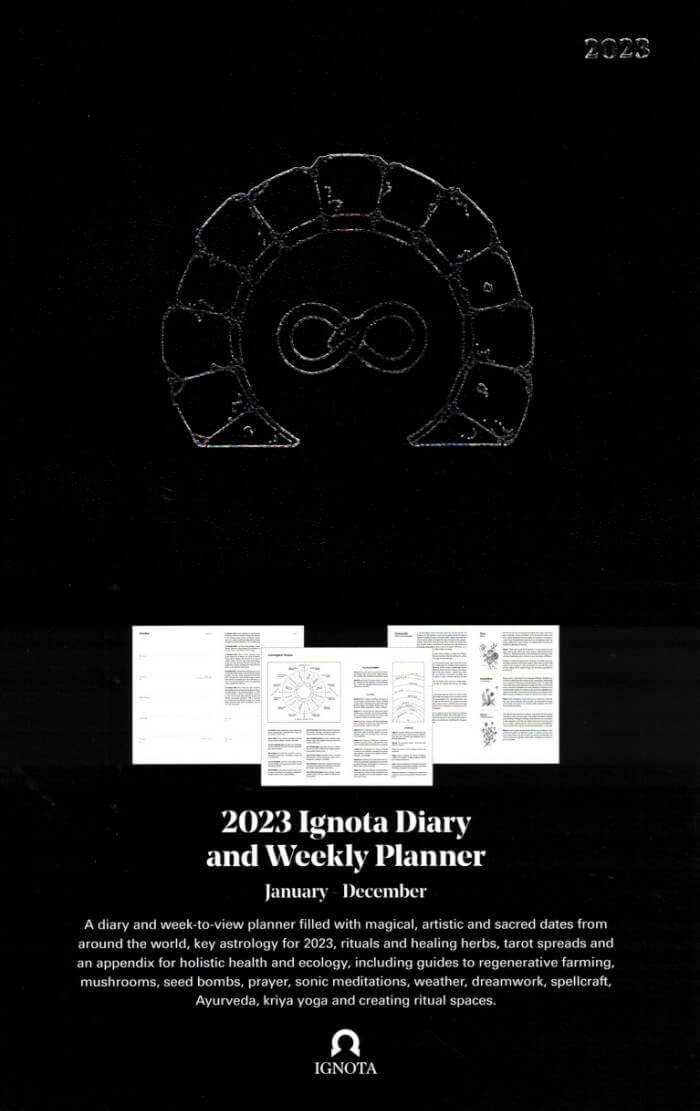
Ignota Diary 2023
This beautifully designed diary and week-to-view planner is filled with historically significant magical and sacred dates from around the world. Drawn from events such as the Buddha’s birthday, esoteric festivals and artistic and occult history, the diary touches on the lives of characters such as Ursula K. Le Guin, Ithell Colquhoun, Zora Neale Hurston, Carl Jung, Simone Weil, Leonora Carrington, Maya Deren, Aleister Crowley, George Bataille, Timothy Leary, Hilma af Klint, Saint Hildegard of Bingen, William Blake, W.B. Yeats and Octavia Butler.
Contributors:
Acupressure by Maria Christofi, Astrology by SJ Anderson, Ayurveda and Prajna by Mira Manek, Dreamwork by Jennifer Dumpert, Herbal Remedies by Paige Emery, Kriya Yoga by Rachel Okimo, Korean Ink Illustrations by Jungran Kim, Mushroom Guide by Ellen Percival, Prayer Guide by K Allado-McDowell, Regenerative Farming by Elias Haase, Rituals by Pam Grossman and Himali Singh Soin, Ritual Spaces by Leila Sadeghee Seed Bombs by Jenna Sutela, Soji by Shoukei Matsumoto, Sonic Meditation by Pauline Oliveros, Spellcraft by Bones Tan-Jones, Tarot by CAConrad and T. Susan Chang, Weather by Jay Drinkall

Worms #5 'Impurity'
In this issue, Worms explores New Narrative alongside writers working today that incorporate some of it’s themes. The cover star Saidiya Hartman talks with Rhea Dillon about the limits and processes of creating stories from the archive, while Camille Roy and Dodie Bellamy give insight into New Narrative from their experiences involved in the movement. Savannah Knoop tells about their life playing the character of J.T Leroy, while Calla Henkel delves into ideas of using other people’s narratives as our own. There’s lots of gleaning, lots of stealing and lots of hard truths coming from the human body. There is poetry and fiction and all of the usual bits, as well as an experimental cut up piece demonstrating the appropriation method that Kathy Acker (via William Burroughs) used in so much of her work. Many more worms to be found in these pages.
Featuring:
Saidiya Hartman, Camille Roy, Dodie Bellamy, Lynne Tillman, Estelle Hoy, Rhea Dillon, Savannah Knoop, Lauren Fournier, Madelyne Beckles, Joanna Walsh, Anne Turyn, Cristina Morales, Calla Henkel, Jenny Zhang
Contributors:
ZARA JOAN MILLER, HAYDEE TOUITOU, NICOLE DELLA COSTA, CECILIA PAVON, VALENTINA VON KLENCKE, FEYI ADEGBITE, ALICE PLATTI, VICTORIA CAMPA, ALICE BUTLER, CLEMMIE BACHE, CAITLIN MCLOUGHLIN, JACK STUART MILLS, HONOR WEATHERALL, ARCADIA MOLINAS, AIMEE BALLINGER, WES KNOWLER, ELEANOR WANG, KATY DADACZ, OLIVE COURI, RACHEL CATTLE, ISABELLE BUCKLOW, SARAH BODRI, HOPE ROAFL, MAURA SAPPILO, JODIE HILL, JACQUELINE ENNIS COLE, MARY WATT, DELIA RAINEY.
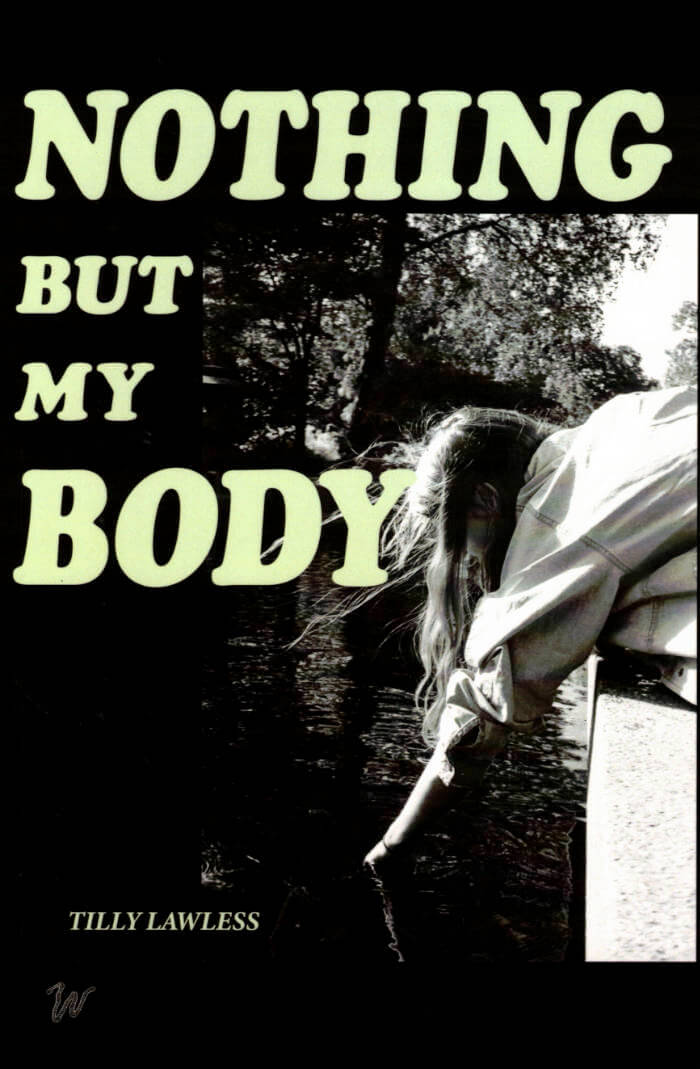
Nothing But My Body
Nothing But My Body is an eight-day journey through the mind of a young woman, a queer sex worker in Australia, as she navigates breakups and infatuation across just over a year.
The unnamed narrator’s voice is both fierce and vulnerable, defiant and tender, as she explores the interplay between her external and internal world, and the fluctuations of her emotions as love affairs intensify and wane. Her loneliness is assuaged by her beloved chosen family-her friends-and by the beauty of the natural world.
Set during the cataclysmic bushfire season of 2019 and into the coronavirus pandemic and lockdown, sex work is the constant backdrop of the story as it moves between Sydney, Berlin, Orange and Bellingen. The beauty of the writing and the moving and deeply engaging sense of compassion that threads through this remarkable novel give true meaning to the concepts of inclusivity and community in surprising and original ways.
This stunning, unflinching and lyrical debut is both a rejection of romantic love, a euphoric celebration of the queer community and a reckoning with the body as both abject and joyous.
...
Worms Publishing works across form and genre to bring experimental writers to the literary topsoil. Working outside of conventional publishing, Worms endeavours to support and cultivate underrepresented voices with a focus on female and non-binary authors and artists.
Nothing But My Body by Tilly Lawless is Worms’ first title. This fictionalised stream of consciousness, takes an unflinching look at sex work, queerness, class and mental health from the perspective of a Sydney-based sex worker over eight days.

Verlag der Buchhandlung Walther König
Cologne art fair 1977
Jack Smith presented his performance Irrational Landlordism of Bagdad as part of the Cologne Art Fair fringe in the summer of 1977. Many other events were documented photographically and can now be found in the Cologne Art Fair archives - not so Smith's performance.
This book shows him in his fair stall and during his performance for the first time. The pictures are perfect documents of a completely eccentric transaction by this pioneering director and performance artist.
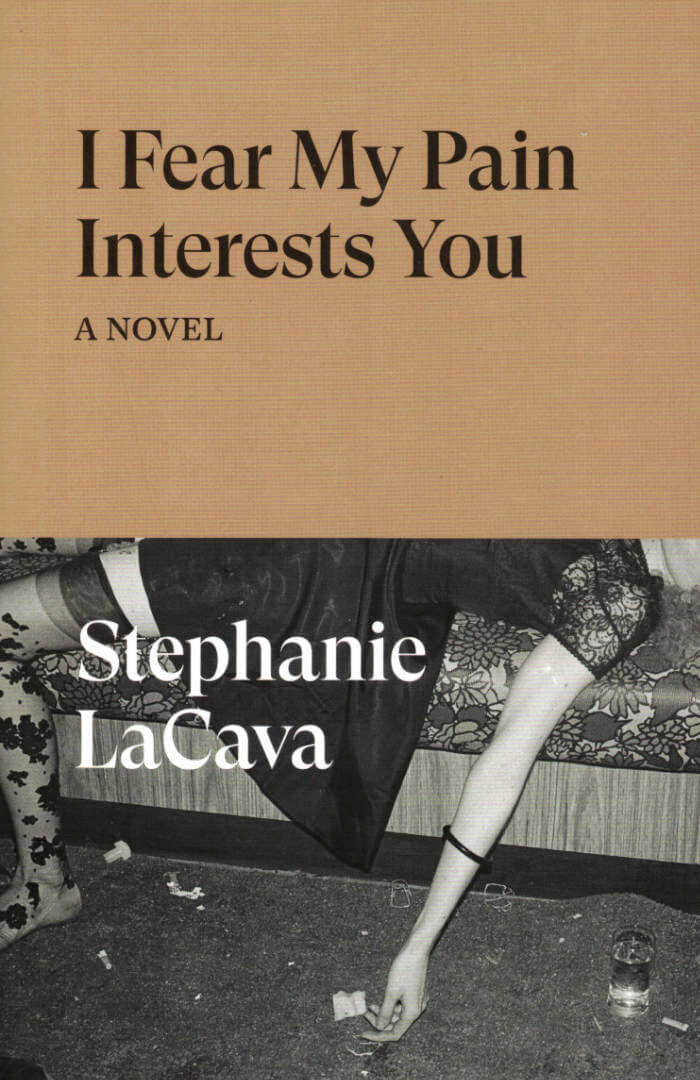
I Fear My Pain Interests You
A punky, raw novel of millenial disaffection, trauma and 1960s cinema.
Margot is the child of renowned musicians and the product of a particularly punky upbringing. Burnt-out from the burden of expectation and the bad end of the worst relationship yet, she leaves New York and heads to to the Pacific Northwest. She's seeking to escape both the eyes of the world and the echoing voice of that last bad man. But a chance encounter with a dubious doctor in a graveyard, and the discovery of a dozen old film reels, opens the door to a study of both the peculiarities of her body and the absurdities of her famous family.
A literary take on cinema du corps, Stephanie LaCava's new novel is an audaciously sexy and moving exploration of culture and connections, bodies and breakdowns.

Pleasure Activism: The Politics of Feeling Good
How do we make social justice the most pleasurable human experience? How can we awaken within ourselves desires that make it impossible to settle for anything less than a fulfilling life? Author and editor adrienne maree brown finds the answer in something she calls "pleasure activism," a politics of healing and happiness that explodes the dour myth that changing the world is just another form of work. Drawing on the black feminist tradition, she challenges us to rethink the ground rules of activism. Her mindset-altering essays are interwoven with conversations and insights from other feminist thinkers, including Audre Lorde, Joan Morgan, Cara Page, Sonya Renee Taylor, and Alexis Pauline Gumbs. Together they cover a wide array of subjects—from sex work to climate change, from race and gender to sex and drugs—building new narratives about how politics can feel good and how what feels good always has a complex politics of its own.
Building on the success of her popular Emergent Strategy, brown launches a new series of the same name with this volume, bringing readers books that explore experimental, expansive, and innovative ways to meet the challenges that face our world today. Books that find the opportunity in every crisis!
adrienne maree brown, author of Emergent Strategy and co-editor of Octavia's Brood, is a social justice facilitator focused on black liberation, a doula/healer, and a pleasure activist. She lives in Detroit.

Everything for Everyone: An Oral History of the New York Commune, 2052-2072
By the middle of the twenty-first century, war, famine, economic collapse, and climate catastrophe had toppled the world's governments. In the 2050s, the insurrections reached the nerve center of global capitalism—New York City. This book, a collection of interviews with the people who made the revolution, was published to mark the twentieth anniversary of the New York Commune, a radically new social order forged in the ashes of capitalist collapse.
Here is the insurrection in the words of the people who made it, a cast as diverse as the city itself. Nurses, sex workers, antifascist militants, and survivors of all stripes recall the collapse of life as they knew it and the emergence of a collective alternative. Their stories, delivered in deeply human fashion, together outline how ordinary people's efforts to survive in the face of crisis contain the seeds of a new world.
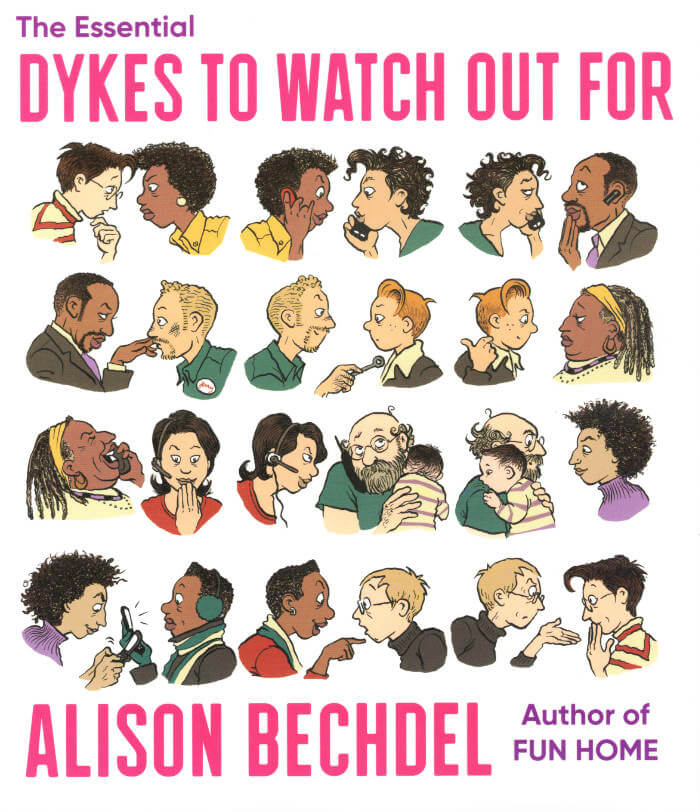
The Essential Dykes to Watch Out for
For twenty-five years Bechdel’s path-breaking Dykes to Watch Out For strip has been collected in award-winning volumes (with a quarter of a million copies in print), syndicated in fifty alternative newspapers, and translated into many languages. Now, at last, The Essential Dykes to Watch Out For gathers a “rich, funny, deep and impossible to put down” (Publishers Weekly) selection from all eleven Dykes volumes. Here too are sixty of the newest strips, never before published in book form.
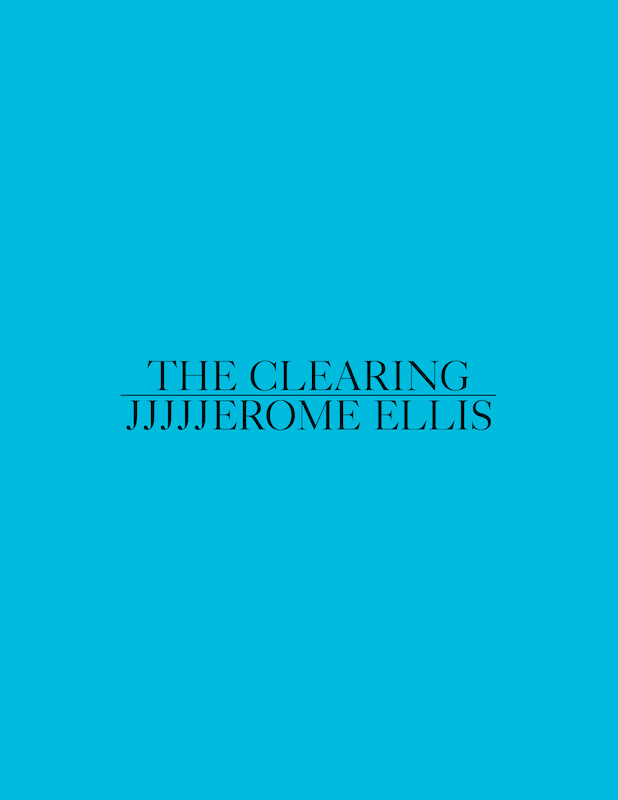
The Clearing
JJJJJerome Ellis’s The Clearing asks how stuttering, blackness, and music can be practices of refusal against hegemonic governance of time, speech, and encounter. Taking his glottal block stutter as a point of departure, Ellis figures the aporia and the block as clearing to consider how dysfluency, opacity, and refusal can open a new space for relation. Stemming from Ellis's essay "The clearing: Music, dysfluency, Blackness, and time,” published in 2020 in the Journal of Interdisciplinary Voice Studies (Volume 5, Issue 2) the present volume transcribes and translates his investigation across genres and media, turning to the page to ask: How can a book bear the trace of music, and the racialized, disabled body? Can a book be not just a manuscript, but a glottoscript? Ellis opens space for thinking liberation theoretically, historically, and lyrically.
"The Clearing is many things: a lyrical celebration of and inquiry into the intersections of blackness, music, and disabled speech; a restless interrogation of linear time; an intimate portrait of the author’s real-time experience of his stutter; a baptism in syllable and sound; and a manuscript illuminated by The Stutter. At its core, Ellis’ metaphor of the clearing becomes a place of possibility and “momentary, transitory, glimpsed liberation.” He invites us to meet him there."—Claudia Rankine

Carmelina: Figures
Ronaldo V. Wilson’s Carmelina: Figures excavates the territory between memory, nation, and embodiment, exploring place as a discipline of the body and an extension of the hand. Through poems, photographs, drawings, records of performance, and home movies recorded in Guam, Tennessee, and the Subic Bay between 1962 and 1979, Wilson reckons with familial heritage, diaspora, and legacies of militarism.
The book pays homage to Wilson’s mother, Carmelina, who served for most of her working life as a certified nursing assistant at Florin Convalescent, an assisted living facility in South Sacramento, California. A glut of signals and media recovers Carmelina’s vivid and urgent experience of exile from the Philippines to marry Wilson’s father—a Black American soldier—being disowned, and before that, of her parents’ assassinations during the Japanese Occupation. Through a visual logic of repetition and reenactment that works to unmoor sensory expectation and narrative logic, Wilson renders her figure as trace, melody against paper, drawing within song, mixed media, dance, and through improvised, masked, and recorded performances in the Berkshires, MA; Long Island, NY; Emeryville, CA; and Boulder, CO. Carmelina: Figures is a book of the Psoas, ice, smudge, and light.

Dearth & God's Green Mirth
A new tête-bêche diptych chapbook from innovative poet Cody-Rose Clevidence, DEARTH & GOD'S GREEN MIRTH discovers dark songs unseen in distant places unheard.
Careening wildly between the philosophical angst of being a human on this planet in this certain moment in human history, and barefaced, godless whimsy, the two projects in this t'teb'che diptych chapbook discard formalisms, even their own, to investigate the relationship between the space of the whole universe and god. Protoformal, DEARTH is a collection of scifi dirges for all of living things on a small contaminated planet. In God's Green Mirth the poet playfully degrades god, for fun.
Cody-Rose Clevidence is the author of BEAST FEAST (2014) and FLUNG/THRONE (2018), both from Ahsahta Press, LISTEN MY FRIEND, THIS IS THE DREAM I DREAMED LAST NIGHT from The Song Cave and Aux Arc / Trypt Ich from Nightboat, as well as several handsome chapbooks (flowers and cream, NION, garden door press, Auric). They live in the Arkansas Ozarks with their excellently named animals.

Queer St Ives and Other Stories
This first ever queer history of St Ives weaves together biography with art and social history to shine new light on a pivotal era in the development of British modernism.
Based on original interviews and previously unpublished letters and diaries, Queer St Ives reveals a fascinating, hitherto undocumented history, adding vital new insight into the history of the fabled British art colony. At the center of this pioneering volume is the sculptor John Milne, who arrived in the southwestern town of St Ives, Cornwall, in 1952, to work as an assistant to Barbara Hepworth. Hidden behind tall granite walls, Milne's house, Trewyn, became a meeting point for queer figures from the arts and was the scene of legendary parties.
The large cast—queer and otherwise—featured here includes artists Francis Bacon, Alan Lowndes, Marlow Moss, Patrick Procktor, Mark Tobey, Keith Vaughan and Brian Wall; Whitechapel Art Gallery director Bryan Robertson; actors Keith Barron and Richard Wattis; potter Janet Leach; writers Tony Warren and Richard Blake Brown; and the extraordinary Julian Nixon, a queer everyman whose involvement in the group has been little explored until now.
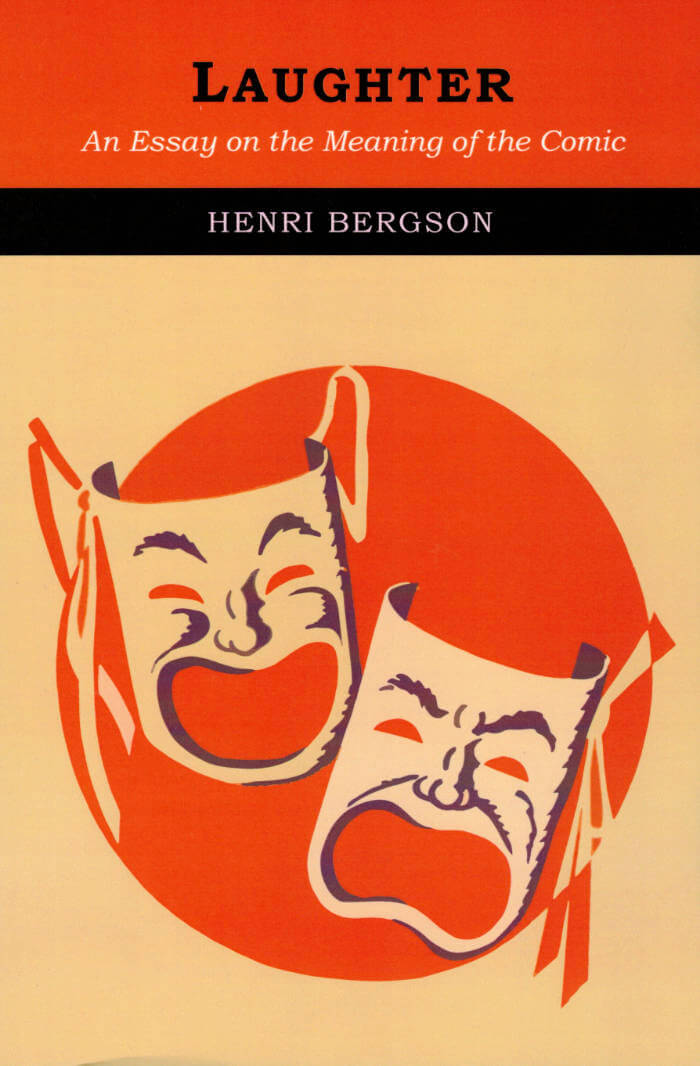
Laughter: An Essay on the Meaning of the Comic
"Laughter" is a collection of three essays by French philosopher Henri Bergson, first published in 1900. In a short introduction, Bergson announces that he will try to define the comic, but he does not want to give a rigid definition of the word; he wants to deal with the comic as part of human life. His ambition is also to have a better knowledge of society, of the functioning of human imagination and of collective imagination, but also of art and life.
Bergson begins to note three facts on the comic: 1] the comic is strictly a human phenomenon. A landscape cannot be a source of laughter, and when humans make fun of animals, it is often because they recognize some human behavior in them. Man is not only a being that can laugh, but also a being that is a source of laughter. 2] laughter requires an indifference, a detachment from sensibility and emotion: 3] it is more difficult to laugh when one is fully aware of the seriousness of a situation. It is difficult to laugh alone, it is easier to laugh collectively. One who is excluded from a group of people does not laugh with them, there is often a complicity in laughter. Thus the comic is not a mere pleasure of the intellect, it is a human and social activity, it has a social meaning.
2014 Reprint of Original 1912 Edition. Exact facsimile of the original edition, not reproduced with Optical Recognition Software.

Dust
Cactus erotica. Dykes taking T erotica. Handmade rope erotica.
Tangentially alien erotica. Clit long like laffy taffy erotica. Death erotica.
In L.A. Warman's anti-sequel to her award-winning debut Whore Foods, two anonymous lovers traverse the vast and lonely desert which has blighted most of the continent. In their possession is the gift of the Vapors, a mystical substance which allows them to transcend death. Yet as they explore the desert realm and each other, they cannot help but wonder if their entwined destiny resides somewhere beyond transcendence.
LA Warman is a poet, performer, and teacher currently based in New York City. Warman is the author of Whore Foods, an erotic novella which recieved a Lambda Literary Award in 2020. She is the founder of Warman School, a non-accredited and body based learning center. The Warman School has taught over 500 students online and in person. She teaches topics such as erotics, death, depression, and god. Pitchfork named her piece ADMSDP one of the top 100 songs of 2020. She has had performance and installation work in shows at MOCA Cleveland, ICA Philadelphia, Time-Based Art Festival, Poetry Project, and Open Engagement. Warman has presented performative poetics research at Brown University, Hamilton College, Reed College, Hampshire College, and others. She is a founding organizer of the Free Ashley Now survivor defense campaign.
"This book is an instant waypoint on my return to the revelation: if nothing else, my tears have a place where they belong—mixed into the dust of others." — Wilmer Wilson IV

TIME (edition)
TIME by Spencer Longo is a collection of printed work depicting government raids, religious visions, environmental catastrophe, and extremist fundamentalism tangled together in a narrative web of salvation, annihilation, and transcendence. Using pen plotter graphics directly on uncollated pages of Time magazine, Longo explores the conspiratorial trope that messages are secretly embedded in mass media, coaxing our millenarian anxieties out through an additive printing process using graphics from survivalist publications, end-times evangelical cartoons, and marginalia from the borders of underground occult material, all sprinkled with ecstatic bursts of star-spangled clipart. A must-have for your fallout shelter's library.
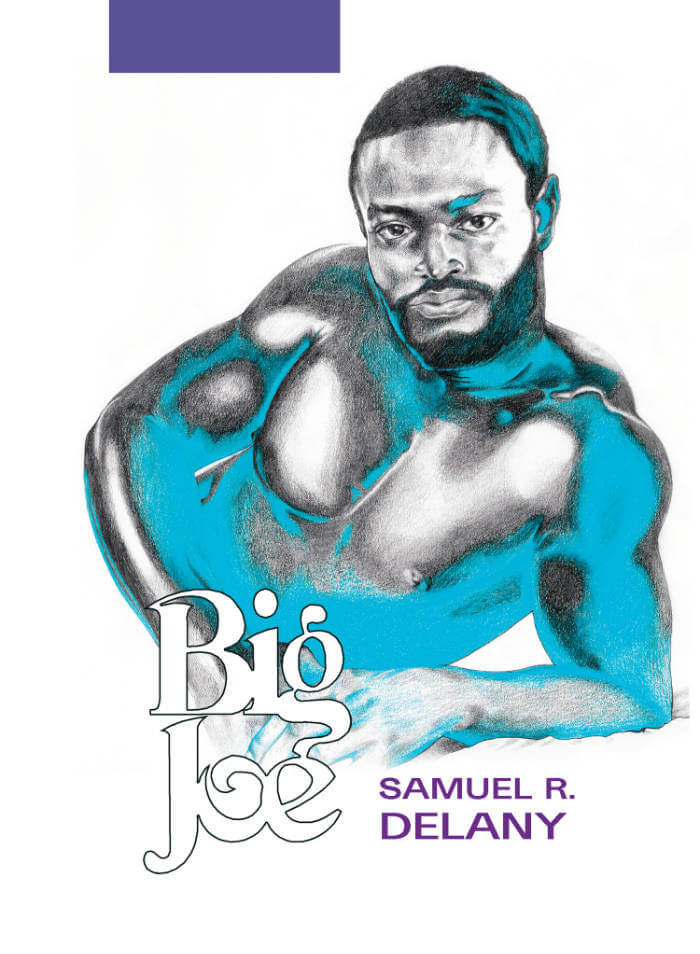
BIG JOE
A chance encounter with two older fellows at the movie theater has the young vagabond Ligie on his way to Lot-8, a trailer park down the road with an unconventional local reputation. There, Ligie meets Big Joe and his extended Lot-8-family: a tight-knit community of freaks all sectioned together by the landlord at the outskirts of town.
Weaving together colorful characters and outright carnal debauchery, BIG JOE is a radical pastoral of community, desire, and the strangeness of knowing one another.
Featuring color illustrations by Drake Carr and Sabrina Bockler.
Cover illustration by Drake Carr
Samuel R. Delany is the author of numerous books and novels, including the Nebula Award-winning Babel-17 and The Einstein Intersection, as well as Nova (now in a Library of America anthology) and Dhalgren. His 2007 novel Dark Reflections won the Stonewall Book Award. Other erotic novels include Equinox, Hogg, The Mad Man, Throu gh the Valley of the Nest of Spiders, and Shoat Rumblin. Delany was the subject of a 2007 documentary, The Polymath, by Fred Barney Taylor, and he has written a popular creative writing textbook, About Writing. He is the author of the widely taught Times Square Red/Times Square Blue and numerous books of essays; his book-length autobiographical essay, The Motion of Light in Water, won a Hugo Award in 1989. As e-books, paperbacks, or audiobooks, his works are available through his website at: www.samueldelany.com

Desiderata
Desiderata is a collection of Lizzy Mercier Descloux's poetry, photos, and diaristic fragments from her visit to New York City in the winter of 1977. Only eighteen at the time, Descloux fell into the orbits of the nascent No Wave scene festering in Lower Manhattan, where she befriended Richard Hell, Patti Smith, and ZE Records founder Michel Esteban. Desideratacharts the musician's early ambitions as a writer, revealing a potent poetic voice that careens from acid-tinged social observations to outright Dadaist semantic revelry, interspersed with collages and hand-written notes. Originally composed entirely in French, this is the first time these works have ever appeared in English and this edition includes the original French facsimile bound tête-bêche with the new English translation.
Martine-Elisabeth "Lizzy" Mercier Descloux (16 December 1956 – 20 April 2004) was a French musician, singer-songwriter, composer, actress, writer and painter. She collaborated with a wide range of musicians including Wally Badarou and Chet Baker.
Emma Ramadan was initiated into the mystery of Bastet at the age of thirteen and rose to the station of High Scioness. After leaving the temple she hopped freight across the Maghreb, where she began translating esoterica carved into the boxcar walls. She has independently discovered numerous uncatalogued cave systems and varietals of nightshade tea. Her name appears on the underside of stones and in various magazines whose pages seem to turn on their own.
Translated by Emma Ramadan.
Bilingual edition: FR/ENG
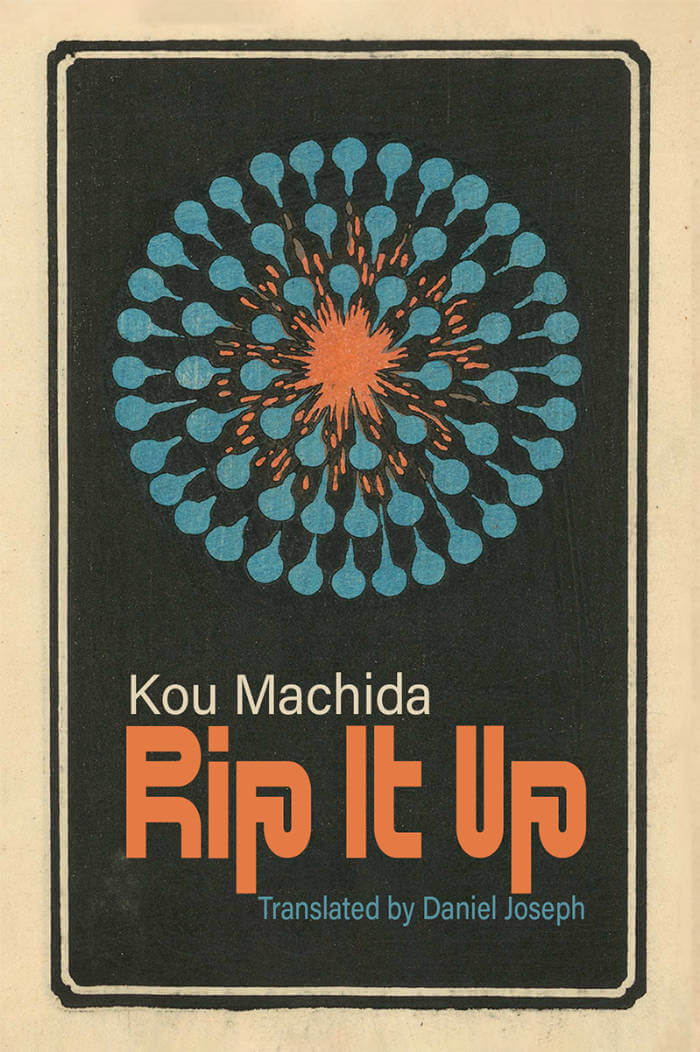
Rip It Up
Rip It Up is the first ever English translation of Kou Machida's award-winning novel, an undertaking over five years in the making and the inaugural title of Inpatient Press's new translation imprint Mercurial Editions.
Set in a kaleidoscopic hyperreal Japan circa Y2K, Rip It Up catalogues the misdeeds and misgivings of a down-and-out wannabe debonair who ekes out a meager living at the fringes of the art world, wracked by jealousy at his friend's success and despondency of his own creative (and moral) bankruptcy. In turn hilarious and also horrifying, Machida's pyrotechnic prose plumbs the discursive depths of the creative spirit, a head-spinning survey of degeneration and self-sabotage.
Kou Machida is a punk singer, actor, and author, who turned to poetry and fiction after releasing one of the seminal Japanese punk albums with his band INU, 1981’s Meshi kuuna! (Fuck Eating!). He has won the Akutagawa and Tanizaki prizes among many others, and his 2005 novel Kokuhaku (Confession) was named one of the three best books of the last thirty years by the Asahi Newspaper.
Daniel Joseph is a translator, editor, and musician who spent his salad days shouting in dank basements before getting a master’s degree in medieval Japanese literature. Recent translation projects include contributions to Terminal Boredom (Verso, 2021), a collection of stories by science fiction pioneer Izumi Suzuki; and the memoir Try Saying You’re Alive! (Blank Forms, 2021) by outsider folk maniac Kazuki Tomokawa.
Winner of the 2000 Akutagawa Prize for Fiction
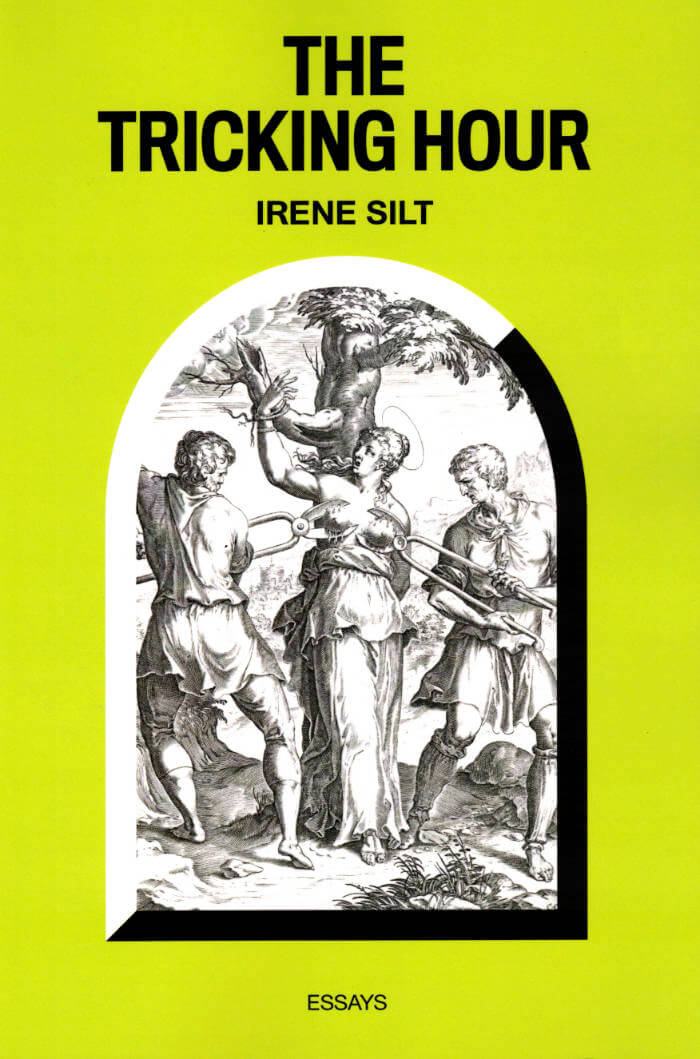
The Tricking Hour
Part anti-work polemic, part sex worker's confession, the luminous essays in The Tricking Hour envision a world organized around collective autonomy, survival, and care, instead of the compulsory exploitation of the body.
Irene Silt writes about power, anti-work feeling, joy, and deviance. Their essays and poems have been published in Mask Magazine, ANTIGRAVITY, Spoil, LESTE, Trou Noir, Poiesis Journal and in the Tripwire pamphlet series. They live in New York.
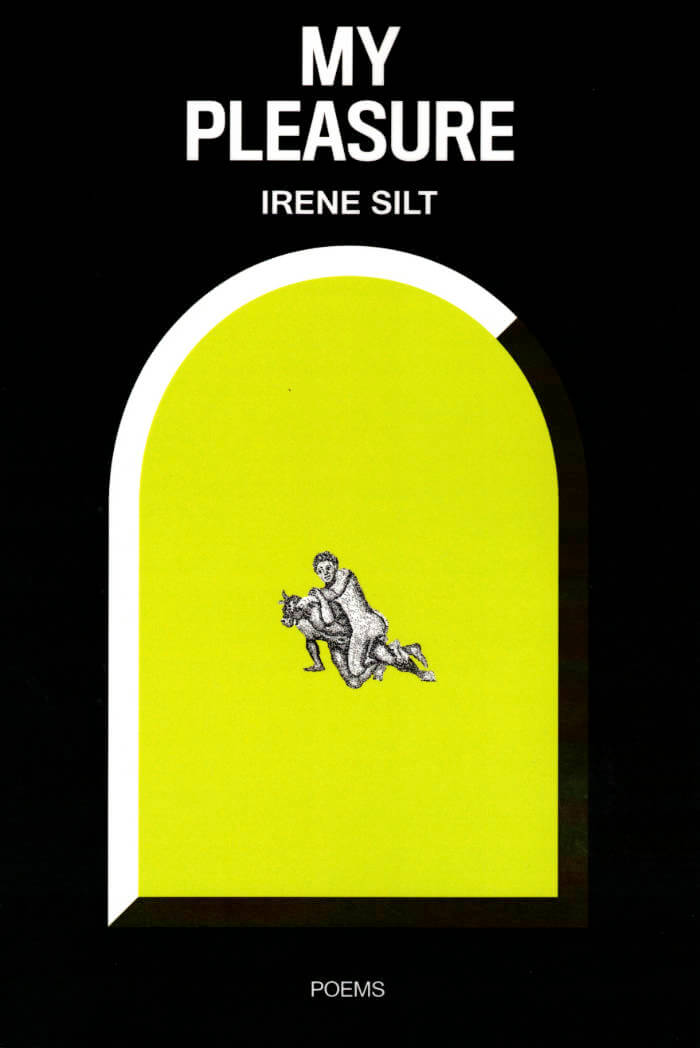
My Pleasure
My Pleasure lives in the poetic entanglements of pleasure, disgust, and agency. Silt asks: Where do we extract pleasure, and what pleasure do we find in extraction?
Irene Silt writes about power, anti-work feeling, joy, and deviance. Their essays and poems have been published in Mask Magazine, ANTIGRAVITY, Spoil, LESTE, Trou Noir, Poiesis Journal and in the Tripwire pamphlet series. They live in New York.